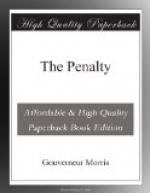The beggar felt that he might dare a little. He smiled. “Of course. What brought me around was the discovery that he had created something far, far more important than what he had destroyed. At first I thought you were like so many other girls of your class—well dressed, and good to look at. Then that you had a very genuine talent, and were going to count in the world. Then, and this is best, it came over me that you were one girl in a million—that you would do whatever seemed right to you, not without fear of criticism, and pain and sacrifice, but regardless of them. And so, you see, the reparation is made. The father hurt, and the daughter cured.”
Barbara’s face had become very grave. “However wrong you are about my character,” she said, “the reparation is not yet made. And you may be sure of this—that, whatever the criticism, I owe you friendship and you shall have it,”
The beggar trembled inwardly, but he shook his head. “You could hardly pull me up to a level,” he said, “upon which friendship between us would be possible. Imagine that I have sunk to the chin in mud, and that at the last time of calling I have been pulled out. Still the mud clings to me.”
“Nonsense,” said Barbara, “you can be washed.”
They both laughed, and at once became grave again.
“You don’t know,” he said, “what I’ve been or what I’ve done. You can’t even imagine.”
“That is not the point,” said Barbara, “and this is: Are you sorry? If you really have been rotten, do you want to be sound and fine? If you do I’m your friend, and whatever help I can give you, you shall have.”
“If you knew,” he said humbly, “how I dread the bust being finished! I’ll be like a child stealing a ride by the strength of his arms, I’ll have to drop off then—won’t I?—back into the mud.”
“I’m not offering you friendship,” she said, “merely while you are useful to me. Do well, Mr. Blizzard, and do good, and I will always be your friend.”
“Do you believe that I want to do well, that I want to do good? That I want to wipe the past from the slate?”
“You have only to tell me,” she said loyally, “and I shall believe.”
“Then I tell you,” he said, and Barbara jumped impulsively to her feet and shook hands with him.
“And I may come to you,” he pleaded, “for advice, and help? Old habits are hard to shake. My friends are thieves, crooks, and grafters. My sources of income are not clean. Even now I have dishonest irons in the fire. Shall I pull them out?”
“Of course.”
“But people who have trusted me will be hurt.”
“You must work those problems out in your own conscience.”
To Blizzard, believing that he was actually making progress into the fastnesses of her heart, and that he might in time gain his ends by propinquity and his own undeniable force and personality, a sudden, cheeky knocking upon the door proved intensely irritating. It was a very small messenger-boy with a box of jonquils. Blizzard watched very closely the expression of Barbara’s face while she opened the box. She held up the flowers for him to see.




